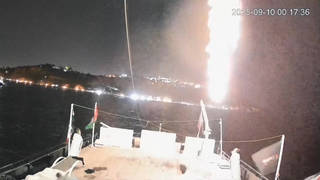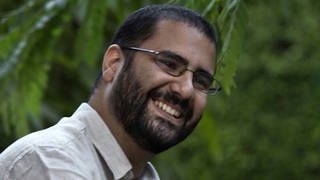
Topics
Guests
- John Stauberco-author of the new book Weapons of Mass Deception. He is the founder and executive director of the Center for Media and Democracy, which publishes the news magazine PR Watch.
- Sheldon Ramptonco-author of Weapons Mass Deception and PR Watch editor.
Links
Authors John Stauber and Sheldon Rampton discuss how the Bush administration created a “show war” through the use of propaganda, lies, half-truths and Hollywood imaging techniques.
Former Vice President Al Gore blasted the Bush administration’s handling of the war on Iraq and domestic economic policy, saying, “Something pretty basic has gone wrong in our country.”
Gore, addressing over 600 people at a MoveOn.org event at NYU yesterday, said the Bush administration’s routine disregard for public debate stifled the truth and misled the public on the threat posed by Saddam Hussein, as well as on domestic issues ranging from the tax cuts to the environment.
Gores said that President Bush and his cohorts in Washington have “developed a highly effective propaganda machine” to push policies in Iraq and in the U.S. that favor friends and supporters at the expense of the public interest
Well, a recently published book takes a closer look at Washington’s propaganda machine.
Weapons of Mass Deception: The Uses of Propaganda in Bush’s War on Iraq examines how the Bush administration created a “show war” through the use of propaganda, lies, half-truths and Hollywood imaging techniques.
Weapons of Mass Deception reveals — headline by headline, news show by news show, press conference by press conference — the deliberate, aggressive and highly successful public relations campaign that sold the Iraqi war to the American public.
Transcript
JUAN GONZÁLEZ: Well, former Vice President Al Gore spoke up recently, last night, for the first time in many, many months. He blasted the Bush administration’s handling of the war in Iraq and domestic economic policy, as well, saying, quote, “Something pretty basic has gone wrong in our country.” Gore, addressing over 600 people at a MoveOn.org event at NYU yesterday, said the Bush administration’s routine disregard for public debate stifled the truth and misled the public on the threat posed by Saddam Hussein, as well as on domestic issues ranging from tax cuts to the environment. Gore said that President Bush and his cohorts in Washington have, quote, “developed a highly effective propaganda machine” to push policies in Iraq and in the U.S. that favor friends and supporters at the expense of the public interest.
AMY GOODMAN: Well, a new book that’s just been published takes a closer look at Washington’s propaganda machine. It’s called Weapons of Mass Deception: The Uses of Propaganda in Bush’s War on Iraq. It examines how the Bush administration created a, quote, “show war” through the uses of propaganda, lies, half-truths and Hollywood imaging techniques. Weapons of Mass Deception reveals, headline by headline, news show by news show, press conference by press conference, the deliberate, aggressive and highly successful public relations campaign that sold the Iraqi war to the U.S. public. John Stauber is with us, as well as Sheldon Rampton. They are the two authors of Weapons of Mass Deception.
Welcome to Democracy Now!
JOHN STAUBER: Hi, Amy. It’s great to be here.
SHELDON RAMPTON: Thank you.
AMY GOODMAN: What I find most interesting about your book are the specific details of the PR companies hired not just by corporations, but by the government, to sell war. But let’s start with the latest news of the Rendon Group. Can you explain what it is, who it’s employed by, and about — talk about casualties in Iraq?
JOHN STAUBER: Well, Sheldon and I —
AMY GOODMAN: John Stauber.
JOHN STAUBER: — very much like talking about the Rendon Group, because most people in the United States have never heard of this firm. But, in fact, the Rendon Group is a very powerful, secretive public relations firm, started by John W. Rendon. And way back in '91, ’92, ’93, after the initial Gulf War, they began receiving a great deal of money, especially from the CIA, to create the Iraqi National Congress. Now, most people in the U.S. turn on a news show and see Ahmed Chalabi, the head of the Iraqi National Congress, and he's treated as if he’s the next George Washington of Iraq. And, in fact, that’s sort of a term that has been promoted to describe him. That organization, the Iraqi National Congress, was very much created, helped along by the CIA. John Rendon, the Rendon PR firm, actually claims to have come up with the name Iraqi National Congress.
And in our book, we do the best job we can. It’s a highly secretive organization, the Rendon Group, of looking at Rendon’s fingerprints. One interesting development in the war that was, to my knowledge, completely unreported here in the mainstream U.S. press was the death of an Australian journalist by the name of Paul Moran, who was killed by a suicide bomber in northern Iraq, an Australian Broadcasting Corporation cameraman and TV journalist. At his funeral in Adelaide, Australia, who shows up but John Rendon. And so, we learned that Paul Moran, the journalist, was also Paul Moran, the employee of Rendon PR, working for the Iraqi National Congress, the CIA front group in Iraq. Just recently, after our book has come out — that’s in our book.
After our book has come out, there’s been some good investigative reporting in Australia looking exactly at the sort of thing Paul Moran, the journalist/CIA PR guy, did for the Iraqi National Congress. And one thing he did was promote one of these many so-called defectors with inside information on the weapons of mass destruction, got that person into the press. He was the person in the electronic media who pushed that story. And the person in the print media who pushed it was New York Times correspondent Judith Miller, who we now know admitted she got most of her, if not all of her, information about weapons of mass destruction through the Iraqi National Congress. So you see this web that reaches out and involves mainstream journalists, CIA front groups, Ahmed Chalabi, who next month will take the reins of the so-called Governing Council in Iraq.
JUAN GONZÁLEZ: You also talk about the PR agencies that the government of Saudi Arabia and as well as the Carlyle Group felt they needed to also contract immediately after 9/11 to clean up their image. Could you talk a little bit about that?
AMY GOODMAN: Sheldon Rampton.
SHELDON RAMPTON: Sure. Of course, the United States is not the only government that employs public relations firms. And in the immediate aftermath of the September 11 attacks, three days afterwards, Burson-Marsteller, one of the largest public relations firms in the world, was hired by the Kingdom of Saudi Arabia to conduct what they called issues counseling and crisis management, which consisted initially of the kingdom publishing advertisements in newspapers expressing their sympathy for the victims and so forth. In November —
JUAN GONZÁLEZ: And the crisis, presumably, was because so many of the hijackers were Saudis, right?
SHELDON RAMPTON: Right. Crisis management is a specific PR discipline that deals with how you manage problems for your reputation. So, if, for example, your plant has had a toxic spill or your CEO has been caught engaging in sexual harassment or something, then you bring in a crisis management team.
So, their crisis was 9/11. The prop isn’t actually to do something for the victims so much as to do something for your reputation. That’s what PR firms specialize in. And so that was the first thing they did. But in November of 2001, just a couple months after the attacks, they also hired another PR firm, Qorvis Communications. And they put them on retainer for $200,000 per month to do similar work, reputation management, crisis management. During the first nine months of 2002 alone, they spent more than $20 million. Just for perspective on that, John and I reported in our first book together, Toxic Sludge Is Good for You, we reported on the PR campaign conducted by the government-in-exile of Kuwait to promote the first war in the Persian Gulf. At that time, the government-in-exile of Kuwait had spent $14 million to persuade the American people that that war was a good idea. So, in the first nine months of 2002 alone, Qorvis Communications received more from Saudi Arabia for its PR campaign, which has been largely invisible as far as the American public is concerned. The PR campaign for war in Iraq has been more visible. But Saudi Arabia spent all that money simply to try and manage their reputation. They spent that money on doing things such as, for example, setting up their own front group called the Alliance for Peace and Justice, which is described in its documents as an American organization, when in fact it’s entirely funded by the Saudis.
Other PR firms also went to work for the Saudis. Hill & Knowlton, for example, which is the PR firm that did the work for the government of Kuwait in the first war, courted the Saudis, and they did a fawning interview in the Arab News, which is a publication owned by the monarchy, in which they basically said, “Gee, who’s to blame for September 11? Well, no one is. It’s just the world we live in,” and were rewarded with contracts in excess of $77,000 a month with various Saudi-owned, state-owned companies, such as the oil company Saudi Aramco. Another PR firm, the Gallagher Group, which is headed by a Republican policy analyst, Jamie Gallagher, signed a $300,000 one-year deal early this year to assist Qorvis Communications in its PR campaign for the kingdom.
AMY GOODMAN: Did anyone refuse?
SHELDON RAMPTON: Not for the Saudis, no. Another PR firm, called Attention America, which is run by a guy named Steven Goldstein, was approached by the family of Osama bin Laden for PR assistance in the immediate aftermath of September 11th. And Goldstein is Jewish and pro-Israel. And by trying to hire them, of course, they were doing the same thing that someone who’s accused of rape does when they try and hire a female attorney. You know, they wanted to have a Jew on the payroll, basically. And Goldstein turned them down and said he didn’t want to work with the bin Ladens. So they went and found another PR firm called Hullin Metz & Company. There’s always a PR firm available to do — to represent anyone.
AMY GOODMAN: What about the history of PR when it comes to Iraq, John Stauber, when it comes to Saddam Hussein and the PR campaign that was anti-communist and pro-Ba’athist?
JOHN STAUBER: Well, let me take the first part of that question. Of course, Saddam Hussein was the beloved ally of the senior Bush and Reagan administration, right up to the point where he made the misstep of deciding that he could go in and take over the Kuwaiti oil fields. As Sheldon and I wrote in our first book, Toxic Sludge Is Good for You, April Glaspie, the ambassador to Iraq, was meeting with Saddam, apparently to discuss how the U.S. administration could do a better job of massaging his image in the U.S. We’ve heard so much in this campaign to go to war about how Saddam gassed and used chemical, biological weapons against his own citizens. And that’s absolutely true. He killed thousands of women, men and children. The problem is he did that when he was our wondrous ally, and we looked the other way. So, part of the PR campaign against Saddam was to turn somebody who the senior Bush administration had embraced into an evil dictator. It wasn’t that difficult, because he was an evil dictator, but rather than talk about the things the second Bush administration has talked about — the gassing of his own people — they relied on PR firms like Hill & Knowlton to invent this phony baby killing story that was so successful in getting the first Gulf War going. But this sort of deception —
AMY GOODMAN: And when you say that, it was the story of Iraqi soldiers going in and pulling babies out of incubators.
JOHN STAUBER: Yeah, I often take for granted that people know that story. But the problem is, because it was a phony story and it received tremendous coverage, people usually know the phony story and think it’s real. Tom Shales bit on that in the lead-up to war again in reviewing this HBO documentary about the event, where in his Washington Post preview of the HBO movie, he sort of said as an aside, “Of course, we all remember the baby killing testimony.” Well, unfortunately, people remember it as real. A 15-year-old girl falsely testified before a rigged congressional hearing. It looked like a congressional hearing. It was treated like one. But it wasn’t. No one was under oath. And that became the dominant news story in Washington, about how she had seen Iraqi soldiers ripping babies out of incubators, leaving them to die on the cold floor. That was in October 1990. And that phony story, in which she was rehearsed by the Hill & Knowlton PR firm — she was actually the daughter of the Kuwaiti ambassador to the U.S. —
AMY GOODMAN: But never identified as such.
JOHN STAUBER: But never identified, until much later — really, was the event that helped Congress decide, yes, let’s go to war. This man is a brutal, evil, heinous criminal. And of course he is.
JUAN GONZÁLEZ: But propaganda has always been part of government policies. Many governments, especially the United States, throughout from World War I throughout through World War II, the uses of Hollywood filmmakers to assist building public opinion for World War II. What is particularly different in the current environment in this particular war from what has been attempted in the past, the uses of public relations firms or Hollywood filmmakers?
SHELDON RAMPTON: Probably the scale of it is more massive. But the other thing is that it’s happening at a different point in history. I mean, one of the things that was striking to me right after September 11 was to see a parade of Washington politicians express amazement at the idea that anyone would be angry at United States or hate the United States. And people like Henry Hyde and George Bush said, “You know, the problem is, we just haven’t sold our case in the Middle East. We need to bring in this talent from Hollywood. And, you know, we’re the country that invented Madison Avenue. We should be able to sell ourselves to Arabs.”
The fact is, the United States has been doing that all along. And we talk about the history of U.S. propaganda in the Middle East in our book. Back in the 1950s, the central theme of U.S. propaganda in the Middle East was anti-communism. And so, for example, they went to Walt Disney and asked him if he would make a cartoon. And the script for the cartoon was actually written by the U.S. Embassy in Baghdad, and it was going to feature a menacing bear, the symbol of the Soviet Union, terrifying some primitive cave people, who I guess were intended to symbolize Arabs or something. And they also worked with the then-Ministry of Propaganda in Iraq to promote anti-communist ideology. And on advice from the Ministry of Propaganda in Iraq, they decided that the best way to spread that message was by alleging links between communism and Zionism. That’s the way it was stated in a memorandum from the embassy at the time, which is now declassified, in which the the ministry stated that the feeling of the director general of propaganda is that this is the best anti-communist approach. And so they actually worked with the then-government to spread the idea that support for Zionism is what communism is all about. But they noted that that had the potential to backfire on the United States, since the United States was involved in supporting Israel, and that this would probably also promote anti-U.S. sentiment in the region. And, in fact, anti-communist students spread the pan-Arabist ideology of the Ba’ath Party to the military, which then became the basis for the Ba’ath Party rise to power and the rise to power of Saddam Hussein.
So there’s been a long history of propaganda by the United States in the region. But when I say it’s a different moment in history now, we’re now at a moment in history when we’re facing the backlash, the consequences of our earlier propaganda, and when, in a sense, we’ve already lost the propaganda war for hearts and minds in the Middle East in a way that we hadn’t lost it previously. At the beginning of the campaign by the United States to sell this better image of the United States right after September 11, one of the editors of an Arab American newspaper commented that at this point the United States could have the Prophet Muhammad doing public relations for them, and it wouldn’t help.
AMY GOODMAN: We’re talking to Sheldon Rampton and John Stauber. They are author of Weapons of Mass Deception: The Uses of Propaganda in Bush’s War on Iraq. Victoria Clarke and Charlotte Beers. Let’s talk about PR execs who then become a part of the U.S. government and the Pentagon and the State Department.
JOHN STAUBER: Well, Amy, let me mention Victoria Clarke, because I was talking earlier about the role of the Hill & Knowlton firm in selling the first Gulf War and in concocting this deception about baby killing. Torie Clarke came out of the Hill & Knowlton firm. To my knowledge, she didn’t work on that particular campaign, but she ran their Washington office. And this is one of the most powerful PR lobby firms in the world. She’s credited, as undersecretary of defense for public affairs, with inventing and promoting this brilliant idea of embedding journalists with the troops. Now, that sounds like something that’s really going to help the media cover the war. But as we know, looking back on the war coverage, it worked just the way Torie Clarke thought it would. The media really identified closely with the war campaign, to the point where many of these reports, the journalists were sort of fumbling over words, talking about “We are now lobbing shells on…” You’ve reported extensively on the problem with the “in-beds,” embedded.
What’s interesting right now, I think, with Torie Clarke is: Where is she? You know, as we report in Weapons of Mass Deception, this whole propaganda campaign is falling apart. Apparently, there are no weapons of mass destruction as they were identified by this administration. The links between al-Qaeda and Saddam are nonexistent. Saddam was not behind the attacks on September 11th. These were why the American people supported this war. These were the lies and deceptions and falsehoods that people like Torie Clark and the rest in the administration helped spread, that the media has repeated over and over and over. And that’s why the American people are so confused. So now it’s time for the chickens to come home to roost. And one chicken that’s flown the coop is Torie Clarke. She’s gone. She resigned in June. Ari Fleischer, gee, he decided this is a good time to leave government also. He’s off to the private sector. And Tony Blair’s top flak, Alastair Campbell, same thing: He’s about to leave. And one thing Sheldon and I know from covering propaganda campaigns for the last 10 years is when the PR flaks in charge start to jump ship, the entire propaganda campaign is falling apart.
AMY GOODMAN: And Charlotte Beers?
SHELDON RAMPTON: Well, Charlotte Beers is an advertising executive who was brought in right after September 11. And her mission was specifically to promote a better image of the United States in the Arab and Muslim world. Beers had her — had won the nickname of the “Queen of Madison Avenue.” She had headed two major ad agencies before going to work for the government in this campaign, too. And she was known as a specialist in what they call brand management. Branding is this sort of quasi-alchemical process of creating an emotional bond between people and a product. One of the things that she represented, for example, was Uncle Ben’s rice. You know, if you look at Uncle Ben’s rice, on every package, you’ll see the picture of this amiable-looking Black man. Well, there is no actual Uncle Ben who has ever been affiliated with the company. So what they want to do is create some kind of emotional bond with you, like — and a lot of companies do that, right? Betty Crocker and so forth. That was her specialty.
So, she was — her approach to branding America was to try to do a similar thing. She tried to bring in celebrity athletes with a Muslim connection, like Muhammad Ali, and she ran these very fuzzy, gauzy advertisements as part of what they called a shared values campaign. They would, for example, show a smiling Arab or Muslim American school teacher, you know, talking about how wonderful her life was in the United States and how tolerant everyone was of Islam in the United States. They printed these pretty pictures of mosques in America and turned them into posters. And so, the message they tried to sell us with was the idea that the United States is tolerant of Islam here at home.
Well, the problem with that is that they weren’t even listening to what people were actually concerned with in the Arab and Muslim world. People in that part of the world are aware that there’s some religious tolerance here, and they approve of that. What they’re upset about is U.S. support for Israel and our support for repressive and autocratic regimes, like the regime of Saudi Arabia. And so, her campaign, like a lot of propaganda campaigns, suffered from the problem of talking and not listening, and failed miserably. By the time she resigned, about a year after taking the job, the United States’ reputation in the Arab and Muslim world had plummeted dramatically. And in Kuwait, only 28% of people polled said they had a favorable opinion of the United States, and in Saudi Arabia it was 18%.
AMY GOODMAN: We’re talking to Sheldon Rampton and John Stauber. Juan’s got another question. We have to break, though, and we’ll come back with you, authors of Weapons of Mass Deception: The Uses of Propaganda in Bush’s War on Iraq. I know they have to head off right after the show, racing to ABC, NBC, CBS, where they’re — well, it’s very interesting. Their book is going to, what, debut as number four on the best-seller list in the San Francisco area, but looks like there is a media whiteout on them. And we’re going to talk about that, as well, a best-seller, but they’re not relevant in this post-war age. Stay with us.
[break]
AMY GOODMAN: Erykah Badu, here on Democracy Now! She’ll be with us in a few minutes live. I’m Amy Goodman, with Juan González, as we finish up our conversation with Sheldon Rampton and John Stauber, authors of Weapons of Mass Deception: The Uses of Propaganda in Bush’s War on Iraq. Juan?
JUAN GONZÁLEZ: The American people, obviously, many of them, actually still do believe that Saddam had something to do with 9/11. Could you talk about what were some of the key elements that you were able to dissect at how the Bush administration got that amazing piece of propaganda into the American consciousness?
SHELDON RAMPTON: Well, one of the interesting things about that, and it’s true of a lot of propaganda, one of the bywords of people who work in PR is “Never tell a lie.” Well, they interpret that instruction very liberally, but they do try to avoid telling outright lies. And you don’t find a lot of outright lies that the Bush administration told about al-Qaeda, but what they did is they constantly mentioned al-Qaeda and Iraq in the same breath and strongly insinuated.
One of the stories that they promoted quite a bit is a story that circulated as a rumor immediately after 9/11 to the effect that one of the hijackers, Mohamed Atta, had met in Prague with an Iraqi diplomat. This is a story that originated with someone in Prague who had seen — who saw the picture of Mohamed Atta after 9/11 and thought he looked like someone that he recognized. It turns out that there’s no basis for the story other than this one person’s rather shaky memory. It also happens that the diplomat in question, this Iraqi diplomat, had some business dealings with a car dealer who bore an interesting resemblance to Mohamed Atta, so maybe that’s what he saw. But in any case, the FBI investigated this rumor extensively. They reviewed, you know, thousands of pages of documents, tracked Mohamed Atta’s movements with a great deal of detail and found out that he was in the United States throughout the period when this person thought he might have seen him in Prague. Moreover, Václav Havel, the president of the Czech Republic, investigated the story personally and reported back to the Bush administration that there was no basis for it. And so the Bush administration certainly knew that there was no truth to this story about Mohamed Atta supposedly having met with an Iraqi official, but they continued to repeat it and to insinuate it. So, for example, Paul Wolfowitz gives an interview, and the interviewer asked him, “Well, you’ve been talking about the story about Mohamed Atta in Prague, but that’s been called into question, hasn’t it?” And Wolfowitz said, “Well, that gets us into classified areas, and we can’t go into the detail.” So, every time a specific question is asked, he uses the excuse of classification to avoid answering specifics, and insinuates strongly that there’s still a basis for it.
AMY GOODMAN: In this last minute, tell us about the reception of your book, the difference between those that are trying to buy it and those that will not cover it.
JOHN STAUBER: Well, this has been an interesting book. A major publisher contacted us and said, “Can you write a book in six weeks on the war? We want to get it out there so it can inform the debate.” The book has been incredibly reviewed in Australia and Britain, where it’s come out. It got a great review in the San Francisco Chronicle. Here we are in New York City, the media capital of the United States, and our publisher, Penguin, of course, has been flogging the book incredibly, trying to get the media interested in telling the story. But, you know, we’re forced to do the best news show in the United States, Democracy Now!, but we can’t get on sort of second-tier shows like The Today Show and, you know, these others that people might have heard of.
The media sold this war. There wouldn’t have been the war, had not the media taken these insinuations, passed them on as fact, confused the American people. And so, I guess to expect the major media that did that to have on a couple of guys who have documented the propaganda campaign might be asking too much.
AMY GOODMAN: And are naming names of the companies that helped to produce the newscasts?
JOHN STAUBER: And the reporters. We’ve got that great Jeremy Glick segment with Bill O’Reilly, where Bill O’Reilly is yelling, “Shut up! Shut up! Shut up!” to a brave young gentleman whose dad was killed on 9/11, because O’Reilly just has him on to beat him up and as part of Fox’s march to war.
AMY GOODMAN: Well, I want to thank you for being with us, and I encourage people to read this book. In chapter three, “True Lies,” you have the question asked of Donald Rumsfeld, “Will you ever lie in prosecuting this war?” And the final question, after Rumsfeld answers, saying, “Will that go for everybody in the Department of Defense?” when Rumsfeld said, no, he wouldn’t lie, Rumsfeld said, “You’ve got to be kidding,” and then establishing the Office of Strategic Influence, which was specifically set up to plant false stories. Because of the bad press, they were forced to disband it. But what was Rumsfeld’s comment after they were forced to disband it?
JOHN STAUBER: Rumsfeld admitted, somewhat later, that basically he disbanded it in name only. And in fact, we were talking about the Rendon Group. Their contract under Office of Strategic Influence continued.
AMY GOODMAN: Well, we want to thank you for being with us. Thank you very much, John Stauber and Sheldon Rampton, Weapons of Mass Deception: The Uses of Propaganda in Bush’s War on Iraq. Thank you.
SHELDON RAMPTON: Thank you.












Media Options